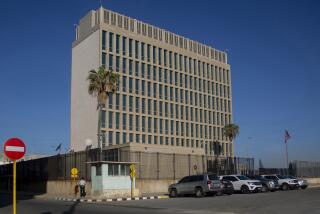Veterans’ long-term ills linked to brain injuries
- Share via
Traumatic brain injuries, one of the signature injuries of the wars in Iraq and Afghanistan, can be linked to such long-term problems as seizures, aggression and dementia reminiscent of Alzheimer’s disease, according to an Institute of Medicine report released Thursday.
Even mild brain injuries, the report found, appear associated with some long-term problems.
The report is a wake-up call, said Dr. Michael Yochelson, who specializes in traumatic brain injury at National Rehabilitation Hospital in Washington and used to work at the National Naval Medical Center.
“We need to be prepared to take care of these people, and we need to be observant,” said Yochelson, who was not involved in the institute’s report.
A recent Rand Corp. report on which Yochelson worked estimated that 300,000 troops returning from Iraq and Afghanistan -- 19% -- had suffered traumatic brain injuries. Such injuries have cost the nation $554 million in treatment and lost productivity, that report estimated.
The brain can be traumatically injured many ways, not all of them predictable: exposure to an energy source, for example, as well as bullet or shrapnel wounds or blows to the head. The injured person does not necessarily lose consciousness, doctors say.
The report by the nonprofit Institute of Medicine was the latest installment in a series of studies commissioned by the Department of Veterans Affairs on the health of veterans from the 1991 Gulf War and current conflicts.
The study was intended to help VA officials understand what conditions they should look for in brain-injured patients and to help officials determine disability benefits, said Dr. George W. Rutherford, chairman of the committee that wrote the report.
The authors reviewed 1,900 studies on traumatic brain injuries, looking for problems that persisted more than six months. Most of the research focused on civilians.
The report showed a “big hole” in medical knowledge about blast injuries, which have only recently come to doctors’ attention because they are hallmarks of the Iraq and Afghanistan wars, Rutherford said.
“The good news is, [service members] are surviving injuries they had not survived in the past,” Rutherford said. “The bad news is, since they didn’t survive in previous conflicts, we don’t have a lot of background experience.”
The group found significant evidence connecting moderate or severe brain injuries to problems such as depression, unemployment and Parkinson’s-disease-like tremors.
VA officials, who said they would carefully review the report’s recommendations, have 60 days to decide whether the long-term problems should be treated as related to brain-injured veterans’ military service.
Military officials said they knew about the issues cited in the report and had dedicated $300 million in the last two years for research on traumatic brain injury.
They have also recently started a long-term study on blast injuries.
“In terms of funding . . . we have received tremendous support, and as we identify emerging requirements, we will continue to gain the support we need,” said Army Brig. Gen. Loree K. Sutton, who heads the Defense Centers of Excellence for Psychological Health & Traumatic Brain Injury.
She and Air Force Lt. Col. Michael S. Jaffee, who heads the Defense and Veterans Brain Injury Center, said they were prepared to deal with the long-term challenges.
“It’s not that we completely have all the answers right now, but we are on a path of getting there,” Jaffee said.
Paul Sullivan, who heads the advocacy group Veterans for Common Sense, said he hoped the VA and Department of Defense would follow through.
The agencies “cannot deny that there is a TBI crisis,” Sullivan said. “We can’t let this get swept under the rug.”
--






